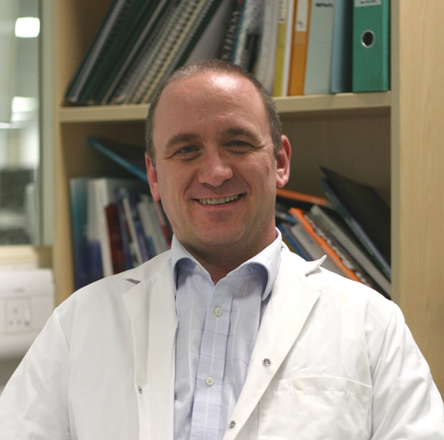Ian Forber
ECG Bulletin January 2015
ECG committee member Ian Forber is the Deputy Technical Manager at ALcontrol Laboratories (Hawarden) and the ECG’s web pages co-ordinator. Here he tells us about his career as an environmental chemist.
|
What inspired you to become a scientist?
I had an interest in and an aptitude for the sciences and mathematics at school. When I finished full time education I very nearly became a bank cashier. Instead I chose to work in a laboratory attached to a metal refinery. As part of the job, I was sent to college on day release to study chemistry through the BTEC NC/HNC system and finally on to university. It was during this time that I realised that chemistry is a lot more interesting than banking. How did you come to specialise in inorganic analytical chemistry?
In my first job, we mostly analysed metals and metal residues. This suited me well as I have always been more interested in the areas of chemistry involving formulae and calculations with a precise result. My interest in the environmental aspects of chemistry developed from dealing with the Environment Agency following the introduction of Integrated Pollution Control (IPC) Regulations in the mid-1990s. When the opportunity came up to work as a technical specialist at ALcontrol, a laboratory specialising in environmental analysis, I jumped at the chance to work somewhere more closely involved in environmental concerns. |
Could you describe your current job?
ALcontrol is a multinational contract laboratory with over 60 laboratories across Europe. The laboratory I work for is the UK’s contaminated land and non-potable waters division. As part of the technical team, I develop and validate new analytical methods, help to support and improve current methods used in routine production analysis, and resolve customer queries. The technical team also undertakes non-routine projects for customers, giving us a chance to think creatively. As Deputy Technical Manager, I also support the Technical Director and cover for him when required.
What advice would you give to anyone considering a career in environmental chemistry?
It can be a rewarding career if you have a genuine interest in the subject. Being truly interested will help you go further in any field and feel more fulfilled in your work. Environmental chemistry covers such a wide scope that I would suggest keeping your options open as you start your studies until you find an area that both suits and interests you.
What are some of the challenges facing the environmental chemistry community?
From an analytical point of view there are always more compounds of environmental interest coming through that will usually need novel analysis methods. There is also constant pressure to lower limits of detection as regulations get tighter. For instance, the EU Water Framework Directive (WFD) looks for lower limits of detection for some compounds and different assessment approaches for other compounds.
Traditionally, analysis has aimed to determine the total amounts of compounds in the environment. Today, closer attention is paid to the impact levels of compounds and to which forms of particular compounds are most ecologically toxic. This requires, for example, speciation testing and measurement of bioaccessible levels in the environment. The resulting challenge for the environmental analytical community is to develop ever more complex analytical techniques.
What is the most rewarding aspect of your career so far?
There have been several rewarding times in my career. One that comes to mind was a few years ago when I was asked to join the Environment Agency’s Standing Committee of Analysts (SCA) to develop their ‘Blue Book’ standard method for the analysis of cyanides in soils.
If you weren’t a scientist what would you do?
I would probably have pursued a career in banking or accounting. I might have a better salary, but I am glad that I chose a career that challenges me on an almost daily basis.
ALcontrol is a multinational contract laboratory with over 60 laboratories across Europe. The laboratory I work for is the UK’s contaminated land and non-potable waters division. As part of the technical team, I develop and validate new analytical methods, help to support and improve current methods used in routine production analysis, and resolve customer queries. The technical team also undertakes non-routine projects for customers, giving us a chance to think creatively. As Deputy Technical Manager, I also support the Technical Director and cover for him when required.
What advice would you give to anyone considering a career in environmental chemistry?
It can be a rewarding career if you have a genuine interest in the subject. Being truly interested will help you go further in any field and feel more fulfilled in your work. Environmental chemistry covers such a wide scope that I would suggest keeping your options open as you start your studies until you find an area that both suits and interests you.
What are some of the challenges facing the environmental chemistry community?
From an analytical point of view there are always more compounds of environmental interest coming through that will usually need novel analysis methods. There is also constant pressure to lower limits of detection as regulations get tighter. For instance, the EU Water Framework Directive (WFD) looks for lower limits of detection for some compounds and different assessment approaches for other compounds.
Traditionally, analysis has aimed to determine the total amounts of compounds in the environment. Today, closer attention is paid to the impact levels of compounds and to which forms of particular compounds are most ecologically toxic. This requires, for example, speciation testing and measurement of bioaccessible levels in the environment. The resulting challenge for the environmental analytical community is to develop ever more complex analytical techniques.
What is the most rewarding aspect of your career so far?
There have been several rewarding times in my career. One that comes to mind was a few years ago when I was asked to join the Environment Agency’s Standing Committee of Analysts (SCA) to develop their ‘Blue Book’ standard method for the analysis of cyanides in soils.
If you weren’t a scientist what would you do?
I would probably have pursued a career in banking or accounting. I might have a better salary, but I am glad that I chose a career that challenges me on an almost daily basis.


